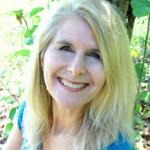by Mary A. Felkins, @MaryAFelkins
If you’ve ever attended a 12-step support group for those struggling with addiction, it’s likely you’ve heard the members recite a traditional introduction before they share.
It goes like this:
“Hello, my name is Sally Sue and I’m an alcoholic (or binge eater or smoker, etc).”
The common intro is meant to keep the participant honest and crush the insidious tendency to remain in denial.
“Problem? What problem? I don’t have a problem.”
If there were a 12-step style writer’s support group for those struggling to complete their manuscripts—particularly when in fast-draft mode–I’d open by saying,
“Hello. My name is Mary, and I’m addicted to wordsmithing.”
In response, I’d expect to hear a, “Hello, Mary” from fellow members, followed by a round of empathetic moans.
The humbling realization that I had a wordsmithing issue hit me during a recent, solitary writing retreat. Months before, I’d scheduled three weeks’ time away from my home office, leaving behind all the responsibilities of a wife and mother, in order to spend focused time with my characters. Specifically, I needed to make great advances on a few manuscripts.
The wordsmithing conundrum manifested itself one day after I’d taken a mid-day break, noodled ideas in my head, and returned to my laptop to add to my story. Despite the mantra, “Keep going, keep going, keep going”, my rebel gaze fixated on a weak verb and, in milliseconds, my mind switched to edit mode.
Drat. A stronger, far better verb popped into my head. I let it convince me it’d make the story sing when, in reality, it only lured me from forward advance. Then…a bad case of poor sentence structure jumped off the screen and mocked, daring me to ignore it.
No way.
I made the one teeny, tiny edit. But just one. Until another weak word glared and I fixed it, too, promising my inner critic I’d never stop to wordsmith again.
Promises, promises. Who knew weasel words in a manuscript could so effectively keep a wordsmith addict in bondage?
Oh, how easy it is to fall prey to the vicious cycle of wordsmithing addiction. Where does it end? Is there hope for wordsmith addicts?
Enter a holy hush, the voice of God intruded to save the day.
“You’re doing it again. Leave those sentences alone. We’ll fix them later. For now, remember this: I’ve called you to write.”
The directive was all it took to still my fingertips over the keys as I offered thanks to the Author of authors for the necessary intrusion and, in faith, left weak words alone.
In the fight against premature wordsmithing, consider these things:
- When you’re in fast draft mode, commit to staying there. God has a story He wants to write.
- Beware the temptation to fix the little things. It’s a distraction that’ll hinder progress and result in frustration for you and your characters.
- Accountability is key. Just like any struggle, it’s unwise to try to overcome it alone. Call or text a writer friend and ask them to pray you through to The End.
Be encouraged, fellow wordsmith addicts. Our manuscript in its final—and best—form is already completed in the mind of God. We need only to answer the call to write and entrust our stories to His tender care.
What if saying yes to love means trusting the kind of man you said you’d never marry?
What if pursuing a woman’s heart means restoring a painful past?
Tracy Cassidy, a fiercely independent ER nurse, must choose between her dream job or staying in her hometown to help support her mother’s faltering ministry. Even if it means risking her heart in love with the kind of man she said she’d never marry.
Why sign up to be Laurelton’s next cop widow?
Tom DeLaney, a hyper-vigilant cop and new hire from Texas, is wearied by years of failed rescue attempts to save his marriage to his ex. A free man, he moves to the foothills of North Carolina. Thing is, he hadn’t expected to fall for Tracy, his supervisor’s sister. But when his adolescent son is diagnosed with a chronic illness, he faces the risk of loving another woman with keep-out issues.
Fears related to the death of Tracy’s cop father and Tom’s inability to forgive the past threaten to sabotage any chance at love. To trust again means surrender. Will they risk their hearts and answer the call?
 Mary A. Felkins is an inspirational romance author, administrator for Seriously Write writer’s blog, and contributor to Refresh, an on-line Bible study magazine. In 2015, she was awarded a bronze medal winner for her scene submission to My Book Therapy’s Frazier contest. Call to Love is her debut, inspirational romance novel.
Mary A. Felkins is an inspirational romance author, administrator for Seriously Write writer’s blog, and contributor to Refresh, an on-line Bible study magazine. In 2015, she was awarded a bronze medal winner for her scene submission to My Book Therapy’s Frazier contest. Call to Love is her debut, inspirational romance novel.
She is a member of the American Christian Fiction Writers and My Book Therapy.
Raised in Houston, Texas (and forever a Lone Star girl), Mary and her husband Bruce moved to the foothills of North Carolina in 1997. They are blessed to parent four young adult children. She can be lured from her writer’s cave if presented with a large, unopened bag of Peanut M&Ms or to watch an episode of Fixer Upper. A surprise appearance by her teen idol, Donny Osmond, would also do the trick, although she’d likely pass out.
If, upon introduction, she likes your first or last name, expect to see it show up in one of her novels.
To receive Mary’s weekly story-style devotions and quarterly book news via email, join other #Felkinsfans at www.maryfelkins.com
https://www.facebook.com/MaryAFelkins
https://www.instagram.com/maryafelkins/
https://twitter.com/MaryAFelkins


